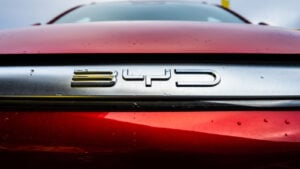Investors are keeping a close eye on this sector since it promises both innovation and long-term development. With governments throughout the globe pushing for cleaner transportation, electric vehicle (EV) firms are benefiting more than ever. This spike in interest reflects a larger trend towards ecologically beneficial investing. It is evident that EV stocks are not a passing fad, but an important component of the future of transportation.
As the EV industry grows, experts are keenly monitoring which EV stocks may lead the drive in 2024. Investors are looking for organizations that can show long-term success in terms of profitability, output growth and market domination. The environment is competitive, but several companies show promise for big development. Against this backdrop, customers are increasingly adopting EVs as a method to decrease their carbon impact, boosting interest in the industry.
Financial health and strategic development strategies will be crucial to select the best EV stocks for the year ahead. At the same time, the future trajectory of the stock is very important as well. With that in mind, let us delve into the best and brightest among the top EV stocks.
Li Auto (LI)

Li Auto (NASDAQ:LI), a trailblazer in the EV sector, is making remarkable strides. It’s not just about the numbers — it’s about setting new benchmarks. In the first quarter of 2023, the company nearly doubled its production. This move signals a robust growth trajectory. Furthermore, Li Auto achieved profitability, a testament to its strategic prowess. With earnings surpassing $200 million, the firm demonstrates fiscal health.
The third quarter brought more accolades for Li Auto. It surpassed revenue forecasts with a staggering $4.75 billion. This 271% growth year-over-year is a clear indicator of its upward momentum. The company’s ability to deliver over 105,000 units in this period sets it apart. Such achievements underscore Li Auto’s competitive edge in the bustling EV market.
However, last year presented a slight challenge with a dip in stock value. Yet, Li Auto’s delivery data told a story of resilience. Shipping over 28,000 vehicles represented a significant 146% increase from the previous year. This resilience not only showcases Li Auto’s operational efficiency but also solidifies its position in the EV landscape.
BYD (BYDDF)

BYD (OTCMKTS:BYDDF) is boosting its growth among EV stocks via strategic worldwide expansion. The business has signed a land agreement in Hungary for a new factory. This expansion demonstrates its commitment to the worldwide EV environment. BYD’s sales in 2023 reached an all-time high, indicating market acceptability. This result reflects increased customer confidence in its EV goods.
Despite the hurdles, BYD’s financial position remains strong. The company’s net profit is on track to increase by up to 86%. This financial resiliency reflects its excellent market position. Furthermore, BYD is expanding its offering with premium EVs. It showcased a high-performance electric supercar, signaling its entry into the high-end market. This audacious approach places it against premium automakers.
BYD’s strategic ambition goes beyond its present successes. Plans to establish a manufacturing foothold in Mexico underline the company’s Americas development plan. Additionally, a large investment in Brazil is planned. These projects demonstrate BYD’s intention to dominate the global EV market. With each strategic move, BYD solidifies its position as a dominant competitor in the electric car market.
Nio (NIO)

NIO (NYSE:NIO) stands apart in the EV sector, thanks in large part to Chinese government funding. This support has been important in the company’s competitive strategy. The government provided a financial lifeline worth nearly $1 billion at a critical juncture during the pandemic. The injection occurred at a time when NIO’s financial reserves were running low, demonstrating the state’s commitment to the EV industry.
NIO has benefited greatly from its partnership with JAC Motors. It enables the firm to concentrate on innovation while using JAC’s production capabilities. This cooperation exemplifies a mutually beneficial relationship, promoting NIO’s development while contributing to the industry’s environment.
However, government assistance includes conditions that limit NIO’s operational flexibility. A fundamental condition of the bailout was establishing Nio China and transferring a large amount of the company’s assets. As a consequence of this agreement, state-owned businesses acquired a large share in Nio China. These agreements show how carefully one must strike a balance between acknowledging government support and maintaining corporate independence.
NIO’s strategic actions go beyond government participation. The company’s plan to locate its headquarters in Hefei coincides with a $1 billion investment arrangement. This relocation not only consolidates NIO’s operations base, but also integrates it into a burgeoning technology cluster. Despite external economic headwinds, NIO’s smart government partnerships and forward-thinking initiatives demonstrate its resilience and development trajectory in the EV sector.
On the publication date, Faizan Farooque did not hold (directly or indirectly) any positions in the securities mentioned in this article. The opinions expressed in this article are those of the writer, subject to the InvestorPlace.com Publishing Guidelines.
Faizan Farooque is a contributing author for InvestorPlace.com and numerous other financial sites. Faizan has several years of experience in analyzing the stock market and was a former data journalist at S&P Global Market Intelligence. His passion is to help the average investor make more informed decisions regarding their portfolio.
